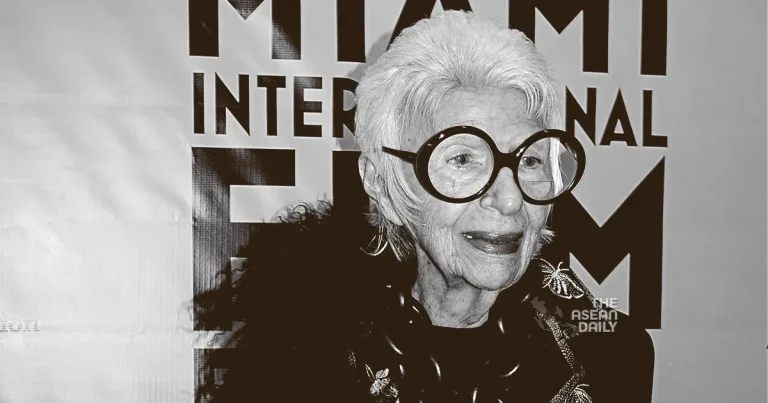2-3-2024 (NEW YORK) Iris Apfel, the renowned New York textile designer, socialite, and self-proclaimed “geriatric starlet” known for her eccentric style, has died at her residence in Palm Beach, Florida. She was 102 years old. The spokesperson for her estate, Stu Loeser, confirmed her passing in a statement but did not disclose the specific cause of death.
Mrs. Apfel, instantly recognizable for her oversized, owl-like spectacles, achieved unexpected fame in the fashion world. She regularly graced the style pages of the New York Times, appeared in advertising campaigns for luxury brands like Kate Spade and Coach, and was photographed by celebrated filmmaker Albert Maysles for Italian Vogue in 2014. Additionally, her life became the subject of a documentary by Maysles.
Even as she approached her 90s, Mrs. Apfel successfully managed multiple fashion lines, including collaborations with MAC Cosmetics for a makeup collection known for its bold colors, eyeglasses designed for Eyebobs, and various handbag, accessory, fragrance, and clothing collections. She even launched a collection on the Home Shopping Network. In 2018, she penned her memoir titled “Iris Apfel: Accidental Icon.”
Her unique and eclectic fashion sense garnered admiration from renowned designers such as Isaac Mizrahi, Jason Wu, and Duro Olowu. Mrs. Apfel became a symbol of aging with audacious style and once told Dazed, a London-based youth fashion and culture magazine in 2012, “Just because you reach a certain age doesn’t mean you have to curl up and wait for the end.”
Before her international fashion breakthrough at the age of 84, Mrs. Apfel enjoyed a successful 42-year career as the co-owner, alongside her late husband Carl Apfel, of a textile firm that designed fabrics for high-profile clients, including first ladies and movie stars. Her fashion journey took off when pieces from her personal wardrobe were displayed at the Metropolitan Museum of Art’s Costume Institute in New York City.
Harold Koda, the director of the Costume Institute, initially asked Mrs. Apfel to lend some jewelry for an accessory-themed exhibit. However, the exhibition evolved into something much grander, showcasing 82 outfits and over 300 accessories from Mrs. Apfel’s collection. Titled “Rara Avis (Rare Bird): Selections From the Iris Barrel Apfel Collection,” the exhibit juxtaposed high-end designer ensembles with whimsical costume jewelry, sumptuous antique Chinese robes adorned with flea-market finds, and luxurious coats paired with feather boas and exotic trinkets.
As art critic Roberta Smith of the New York Times wrote, “Before multiculturalism was a word, Mrs. Apfel was wearing it.” This marked the first time the Costume Institute honored an individual who was not a fashion designer.
Her audacious fashion choices and fearless personality captivated the fashion world. Valerie Steele, a fashion historian and museum director at the Fashion Institute of Technology in New York, described Mrs. Apfel’s style as “excessive” yet harmonious. She further stated, “She taught us you can be creative and fantastic at whatever stage in life you are.”
Mrs. Apfel always emphasized that fashion is an ageless form of individual creative expression. She often quipped to reporters, “More is more, and less is a bore,” and highlighted the importance of embracing one’s uniqueness. Born Iris Barrel on August 29, 1921, in Queens, she inherited her mother’s passion for clothing. However, as a teenager with a curvaceous figure, she faced criticism from saleswomen who urged her to be slim like her mother. To manage her appetite, she resorted to smoking up to four packs of cigarettes a day.
After graduating from the University of Wisconsin’s art school in 1943, Mrs. Apfel won Vogue magazine’s Prix de Paris writing contest and landed a job as a copywriter at Women’s Wear Daily magazine, earning $15 a week. She eventually left the magazine, feeling that the female editors were too old to have babies and too young to face mortality.
She then worked for men’s fashion illustrator Robert Goodman, who paid her $35 a week, a higher salary than any of the men she had dated. During a vacation at a resort in Upstate New York, she met Carl Apfel, whom she later married in 1948. Initially smitten with her, Carl suggested she undergo a nose job to alter her prominent feature. Mrs. Apfel defiantly rejected the idea, and their marriage endured for over six decades until Carl’s passing in 2015 at the age of 100.
In 1950, the couple founded Old World Weavers, specializing in reproductions of antique fabrics. While Iris served as the creative director, Carl managed the business side of the company. Their esteemed clientele included Greta Garbo, Estee Lauder, Emily Post, and Jacqueline Kennedy(Continued)
Kennedy, who entrusted them with their first White House commission in the early 1960s. Over the years, they completed nine historical restorations at the White House before selling their business to Stark Carpet Co. in 1992. They continued to work as consultants for the company until 2010.




